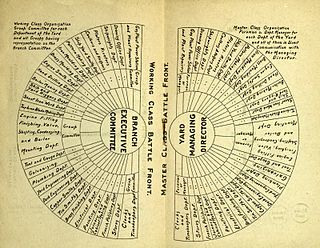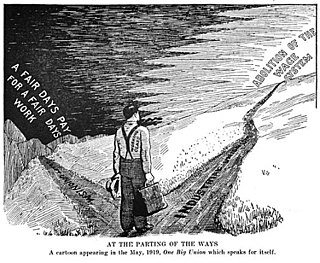Related Research Articles

Syndicalism is a radical current in the labor movement that was most active in the early 20th century. Its main idea is the establishment of local worker-based organizations and the advancement of the demands and rights of workers through strikes. According to the Marxist historian Eric Hobsbawm, it was predominant in the revolutionary left in the decade which preceded the outbreak of World War I because Marxism was mostly reformist at that time.

The Industrial Workers of the World (IWW), members of which are commonly termed "Wobblies", is an international labor union that was founded in 1905 in Chicago, Illinois, in the United States. The union combines general unionism with industrial unionism, as it is a general union, subdivided between the various industries which employ its members. The philosophy and tactics of the IWW are described as "revolutionary industrial unionism", with ties to both socialist and anarchist labor movements.
Anarcho-syndicalism is a political philosophy and anarchist school of thought that views revolutionary industrial unionism or syndicalism as a method for workers in capitalist society to gain control of an economy and thus control influence in broader society. The end goal of syndicalism is to abolish the wage system, regarding it as wage slavery. Anarcho-syndicalist theory therefore generally focuses on the labour movement.

Industrial unionism is a labour union organizing method through which all workers in the same industry are organized into the same union—regardless of skill or trade—thus giving workers in one industry, or in all industries, more leverage in bargaining and in strike situations. Advocates of industrial unionism value its contributions to building unity and solidarity, many suggesting the slogans, "an injury to one is an injury to all" and "the longer the picket line, the shorter the strike."
The International Workers' Association is an international federation of anarcho-syndicalist labor unions and initiatives.

Grandizo Munis was a Spanish politician.
The Revolutionary Workers Ferment, often known by its Spanish name or initials Fomento Obrero Revolucionario or FOR, was a small left communist international founded by Grandizo Munis, which arose as a split from the Trotskyist Fourth International at its Second Congress in 1948.
Anarchism in South Africa dates to the 1880s, and played a major role in the labour and socialist movements from the turn of the twentieth century through to the 1920s. The early South African anarchist movement was strongly syndicalist. The ascendance of Marxism–Leninism following the Russian Revolution, along with state repression, resulted in most of the movement going over to the Comintern line, with the remainder consigned to irrelevance. There were slight traces of anarchist or revolutionary syndicalist influence in some of the independent left-wing groups which resisted the apartheid government from the 1970s onward, but anarchism and revolutionary syndicalism as a distinct movement only began re-emerging in South Africa in the early 1990s. It remains a minority current in South African politics.

Stephen Suleyman Schwartz is an American Sufi journalist, columnist, and author. He has been published in a variety of media, including The Wall Street Journal. He is the founder and executive director of the Washington, D.C.-based Center for Islamic Pluralism. In 2011–2012 he was a member of Folks Magazine's Editorial Board.

The Industrial Workers of the World (IWW) is a union of wage workers which was formed in Chicago in 1905 by militant unionists and their supporters due to anger over the conservatism, philosophy, and craft-based structure of the American Federation of Labor (AFL). Throughout the early part of the 20th century, the philosophy and tactics of the IWW were frequently in direct conflict with those of the AFL concerning the best ways to organize workers, and how to best improve the society in which they toiled. The AFL had one guiding principle—"pure and simple trade unionism", often summarized with the slogan "a fair day's pay for a fair day's work." The IWW embraced two guiding principles, fighting like the AFL for better wages, hours, and conditions, but also promoting an eventual, permanent solution to the problems of strikes, injunctions, bull pens, and union scabbing.

The Industrial Workers of Great Britain was a group which promoted industrial unionism in the early 20th century.
The Syndicalist League of North America was an organization led by William Z. Foster that aimed to "bore from within" the American Federation of Labor to win that trade union center over to the ideals of Revolutionary syndicalism.
Under a variety of names and within a number of organizations over at least 17 years, the group around Harry Turner, or Turnerites was a presence within Trotskyism in the United States.
The Revolutionary Workers League is a small Trotskyist group formed in the United States in the late 1970s. The RWL still has about 20 active members.
The Industrial Workers of the World (IWW) is a union of wage workers which was formed in Chicago in 1905. The IWW experienced a number of divisions and splits during its early history.

The Socialist Labour Party was a socialist political party in the United Kingdom. It was established in 1903 as a splinter from the Social Democratic Federation (SDF) by James Connolly, Neil Maclean and SDF members impressed with the politics of the American socialist Daniel De Leon, a Marxist theoretician and leading figure of the Socialist Labor Party of America. After decades of existence as a tiny organisation, the group was finally disbanded in 1980.
The International Communist League , earlier known as the International Spartacist tendency is a Trotskyist international. Its largest constituent party is the Spartacist League (US). There are smaller sections of the ICL (FI) in Mexico, Canada, France, Germany, Ireland, Italy, Japan, South Africa, Australia, Greece and the United Kingdom.

The Revolutionary Workers League (RWL) was a radical left group in the United States, lasting from 1935 through 1946. It was led by Hugo Oehler and published The Fighting Worker newspaper.
The Industrial Workers of the World or IWW (SA) had a brief but notable history in the 1910s-20s, and is particularly noted for its influence on the syndicalist movement in southern Africa through its promotion of the IWW's principles of industrial unionism, solidarity, and direct action, as well as its role in the creation of organizations such as the Industrial Workers of Africa and the Industrial and Commercial Workers' Union.
The Goldfield, Nevada labor troubles of 1906–1907 were a series of strikes and a lockout which pitted gold miners and other laborers, represented by the Western Federation of Miners (WFM) and the Industrial Workers of the World (IWW), against mine owners and businessmen.